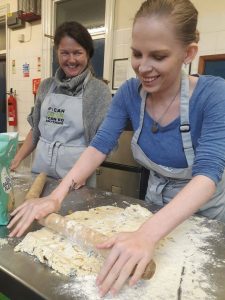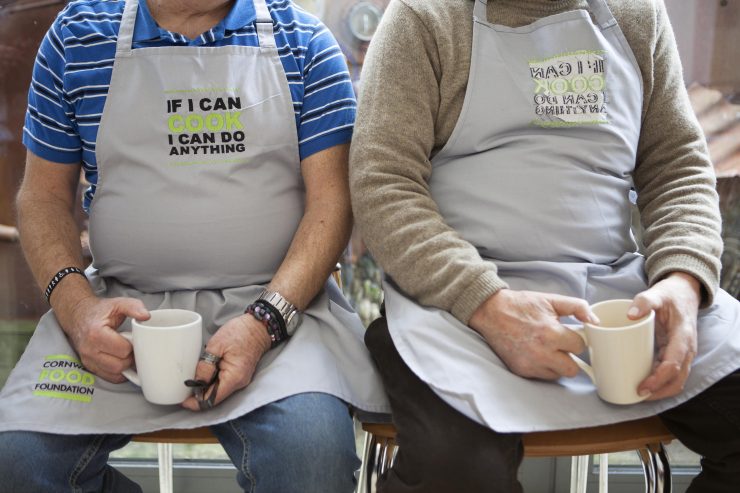What part does faith play in food poverty?
Food Poverty is not going away. Since the report 5 years ago, Feeding Britain, and the faith community’s consistent response to food poverty with foodbanks and emergency provisions, there is so much more to do. The Right Revd Tim Thornton, our former bishop, who was involved in the report and took a strong lead to get voices heard, said, “There is so much more to do… mums and dads, children and older people going hungry in our communities is simply not right…our voices (must) gain volume to say this is not right.”
Transformation Cornwall
Transformation Cornwall, who tackle poverty in Cornwall through faith-based social action, understand that at the root of all faiths is a care for the most vulnerable in society. They work with faith organisations to offer practical support for people experiencing food poverty, hardship and isolation. The issues around food poverty are complex with so much associated shame and stress, all of which faith-based organisations understand and work hard to alleviate. Jane Yeomans, Project Manager, said, “Despite Foodbanks becoming a regular feature of our communities, it’s incredibly hard for people to take that first step to getting help. Faith communities get that. There is no judgement, just love, acceptance and hope.”
Food for Change
 Food for Change is an initiative that takes people beyond crisis point, working with them, through food, to regain confidence, be inspired, empowered and move on to a better way of living. Often working with foodbanks, Food for Change has proved to be an effective force for good.
Food for Change is an initiative that takes people beyond crisis point, working with them, through food, to regain confidence, be inspired, empowered and move on to a better way of living. Often working with foodbanks, Food for Change has proved to be an effective force for good.
Transformation Cornwall were one of their original partners (2017-2019), led by Cornwall Food Foundation (CFF). They supported the programme by employing a community support worker, Nicky Abrahams. Nicky, who worked across two of the four localities, Truro and St Austell, consistently believed in the abilities of all her participants to make real and sustainable change.
As Nicky says, “The impact of food poverty is highly significant and present in many areas of work throughout the Food for Change Programme. It’s a source of stress, worry and anxiety for many people and can leave a feeling of hopelessness and failure when they can’t provide suitable meals for themselves and loved ones.”
“Many access foodbanks, but this can be emotionally difficult as individuals don’t want to rely on them. Faith organisations provide critical support in enabling people to access help without feeling judged. They make their buildings available and facilitate many other actions providing crucial support to those in need. The partnerships faith organisations have with their local communities and compassion for those in need is unrivalled and inspirational.”
“The partnerships faith organisations have with their local communities and compassion for those in need is unrivalled and inspirational.”
Feeding Britain Report
Our initial involvement in Food for Change came from The Right Revd Tim Thornton (the then Bishop of Truro and our then Chair) and his involvement in the All-Party Parliamentary Group on Hunger and Food Poverty in April 2014 and subsequent report ‘Feeding Britain’ (Dec ’14).
Of foodbanks and food poverty he says, “I have been impressed since the first time I met with people volunteering to help with Foodbanks by their commitment … to help people in real need … to see an end to food poverty… I see people of faith compelled to speak out about … people going hungry and day by day hard choices being made by parents and families.”
“I have been impressed since the first time I met with people volunteering to help with Foodbanks by their commitment … to help people in real need … to see an end to food poverty… I see people of faith compelled to speak out about … people going hungry and day by day hard choices being made by parents and families,” The Right Revd Tim Thornton.
In Cornwall, the faith communities are very responsive to the needs of their vulnerable. Revd Jeremy Putnam of All Saints Church Highertown, Truro, welcomes between 600-800 people every week who struggle with food or financial poverty, addiction, disability or isolation. He says, “The work of faith communities in supporting and enabling people out of food poverty is crucial…They are a vital instrument of change, often centred around a vision for justice and transformation. A lot of the time this is seen more publicly through the work of supporting foodbanks, crisis support, and pastoral care; but in addition to this and potentially more powerful, is the everyday gathering of people in community that brings the struggling and confident together, this heightens awareness of the challenges people face and the opportunity to share in the work of transformation and change.”
“(People of faith) are a vital instrument of change, often centred around a vision for justice and transformation,” Revd Jeremy Putman of All Saints Highertown.
What struggling with food poverty looks like
Perhaps some of the most revealing insights into the difficulties faced by people using foodbanks, Food for Change or any of the services that come into contact with faith-based organisations, are the items on a small Crisis Fund that Nicky was awarded from Cornwall Community Foundation:
-
- £6.35:Provision of lunch and drink for an individual that hadn’t eaten a full meal for two days
- £3.60: Provision of bus fare to enable attendance at a support worker session/coffee morning
- £30: Urgent payment on electricity key – no money and benefits not due for 12 days. Needed for heating flat during exceptionally cold period and cooking food.
- £21.70 Formula for baby – benefits payment due in a few days /struggling to budget (getting support to address this) and the formula had run out.
Food poverty isn’t just a trip to a foodbank. It can be the bus fare there, the cooker that’s broken with no money to repair or replace, the electricity to work the cooker.
How faith organisations help
Cornish foodbanks, all of which are faith-based, take a holistic approach. Volunteers don’t just offer bags of donated food and a cup of tea, but the chance to talk and be heard, the opportunity to find out about who else might be able to help with other needs, and the assurance that people are not doing this alone.
In St Austell, Pastor Jon Langford comments, ‘St Austell foodbank is a faith-driven expression of God’s unconditional love for all people. People arrive at the foodbank for all sorts of reasons, and we seek to offer a consistent, sympathetic response in all circumstances. We pride ourselves on offering hope as well as just a food parcel, so we also offer prayer, a listening ear, and have information and support advisers to hand. We regularly signpost people to other agencies, including the churches of St Austell.’
In the west of Cornwall Revd Andrew Yates, who co-ordinates a Food Network across the county to link all the foodbanks, found more ways to help the community through food and faith. Access to free school meals stops during the holidays, contributing to hidden hunger in children. So churches in the Penlee area provide extra food packages and cook lunches for children and families on the Playscheme Project.

Food for Change Foodworks cookery class at Cornwall Neighbourhoods for Change Redruth
Food for Change has been a fantastic project that has worked so well with foodbanks, taking people beyond a crisis and into a much more hopeful situation. As Jane Yeomans says, “We are so encouraged that the initiative is being taken forward by CFF who are leading a second Food for Change programme from September 2019. We celebrate this decision that builds on the huge success of the initial Food for Change programme and the lasting impact it has had on its participants. Food for Change isn’t a faith-based organisation, but faith has been behind it. At so many touch-points, there have been faith organisations, caring, supporting and nudging people gently forward.”
“At so many touch-points, there have been faith organisations, caring, supporting and nudging people gently forward.”
As Pastor Jon Langford says, ‘I believe that what sets the Christian community apart is a holistic concern for the person, and people affected. Hunger is but one symptom of larger circumstances, and our love for Christ drives us to offer all we can for those in need’.





